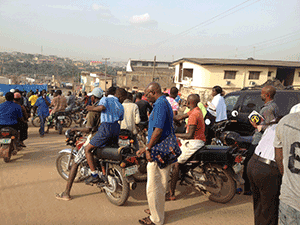This article by TAYO OGUNBIYI of the Features Unit, Ministry of Information and Strategy, Lagos State, is the reaction of the government to the story published in TheNiche on August 31, 2014, with the headline, ‘The elixir, politics, and the risk of Okada resurgence in Lagos.’
An Okada park in Lagos.
One never really anticipates that the ‘ban’ of commercial motorcycles popularly called Okada (motorcycle taxi) in Lagos could become a major subject of discourse at this point in time. But then, this is Nigeria!
The Lagos Traffic Law was signed on August 2, 2012 by Governor Babatunde Fashola. An aspect of the law restricts the operations of commercial motorcycle operators in 495 designated strategic highways and routes out of a total 9,700 routes within the metropolis.
Import of traffic law
The import of this is that the law does not in any way ban the use of Okada. Rather, what it does is to regulate the activities of commercial motorcycle riders. Presently, there are more than 9,000 routes through which Okada riders could effectively operate within the confines of the law.
Being a government that takes a scientific and methodical approach to governance, the enactment of the law restricting Okada operation was primarily meant to protect the interest of the public. It was enacted to ensure that people do not ride on Okada along routes that could put their lives and those of others in jeopardy.
Universally, one of the major responsibilities of government is the protection of the lives of its people. Hence, the Lagos State government is only performing one of its constitutional duties in restricting the activities of Okada.
Without a doubt, the misery and grief that Okada has brought into several homes in Lagos, and indeed across the country, is not unknown to many.
Statistics from the Lagos State Management Authority (LASTMA) showed that no fewer than 619 people were killed or seriously injured in Okada accident between 2011 and 2012.
Up to 107 people died while 512 sustained serious injuries. Among the dead were 71 males and 36 females.
In 2011 alone, 47 people were killed while 98 others sustained serious injuries from Okada accidents. Between January and October 2012, a total 63 people were killed while 59 sustained serious injuries.
Reduction in robbery rate
Aside safety, there is also a security angle. A police report showed that 22 out of 30 armed robbery incidents recorded in Lagos between July and September 2012 involved commercial motorcycles.
Out of eight robberies in July 2012, seven involved the use of Okada, which was also used in five out of eight robberies in August, and in 10 out of 14 robberies in September.
Looking at these facts and figures, there should be no controversy about the fact that the operations of Okada in the state needed to be regulated for the common good of all.
Besides the agony and grief it brings upon its victims, the lawlessness of Okada riders on major highways is quite nauseating, thereby making commuting a harrowing experience.
Therefore, to guarantee the free-flow of traffic and to ensure that the movement of investors coming into the state is not hindered and put at risk, the introduction of the law becomes necessary.
No doubt, every attempt to sanitise and restore order to the hitherto chaos on most of our roads should be embraced, especially going by the traffic situation in Lagos. That is what any responsible government should do.
FCT, other states also restrict Okada operation
To underscore how unpopular Okada has become as a mode of transportation across the country, the Federal Capital Territory and over 15 states have similarly promulgated laws regulating the activities of Okada.
The states include Enugu, Anambra, Delta, Cross River, Akwa Ibom, Rivers, Kano, Kwara, Nasarawa, Kaduna, Edo, Imo, and Katsina.
Hospital daily emergency reduces 60%
Presently in Lagos, regulation is yielding anticipated dividends. Statistics revealed that the accident rate as well as casualty figures occasioned by Okada related accidents have relatively reduced.
A LASTMA data showed that the number of persons killed in Okada accidents was three in September 2012 and one in October. This is much lower compared to 14 deaths in September and October 2011.
Another statistics compiled by the Lagos State University Teaching Hospital (LASU) also revealed that the enforcement of the new traffic law has greatly reduced the number of accident victims received in the hospital and reduced cases of daily emergency by 60 per cent.
This has freed more bed spaces to accommodate other patients, unlike before when Okada accident victims dominated the expansive ward, denying other patients of medical attention and facilities.
Preservation of lives
It is important that Lagosians cooperate with the state government in ensuring the success of the Lagos Traffic Law since it was mainly enacted to protect the people. Life is a precious gift by God. Self preservation is, therefore, the responsibility of every human being. Self-preservation is keeping you alive, either physically or psychologically.
The desire to stay alive is a natural instinct in every human being. The restriction placed on Okada in the state is about preserving lives. We must, therefore, collaborate with the government to preserve lives. The difference between the animal kingdom and human societies is that in the latter, laws are made to regulate human conduct in order to avoid anarchy.
It is in view of the critical nature of public transportation to the overall effectiveness of other sectors that the state government has been particularly focusing on the sector to meet the yearnings of the people.
Transport infrastructure upgrade
The commitment of the state government to improving the transportation sector in Lagos is very defining because it affects the prices of goods and services, improves quality infrastructure, defines how easily children get to school and, indeed, the productivity of the entire economy.
Addressing the transportation and traffic challenges of a complex metropolis like Lagos is a major priority of the state government.
Initiatives such as Lagos Traffic Radio, BRT, modern taxi cabs, improved ferry services, light rails, LASTMA, Lagos Traffic Law, roads redevelopment and modernisation, among others, therefore, represent a positive indicator of laudable attempts to improve the face of public transportation in the state.













